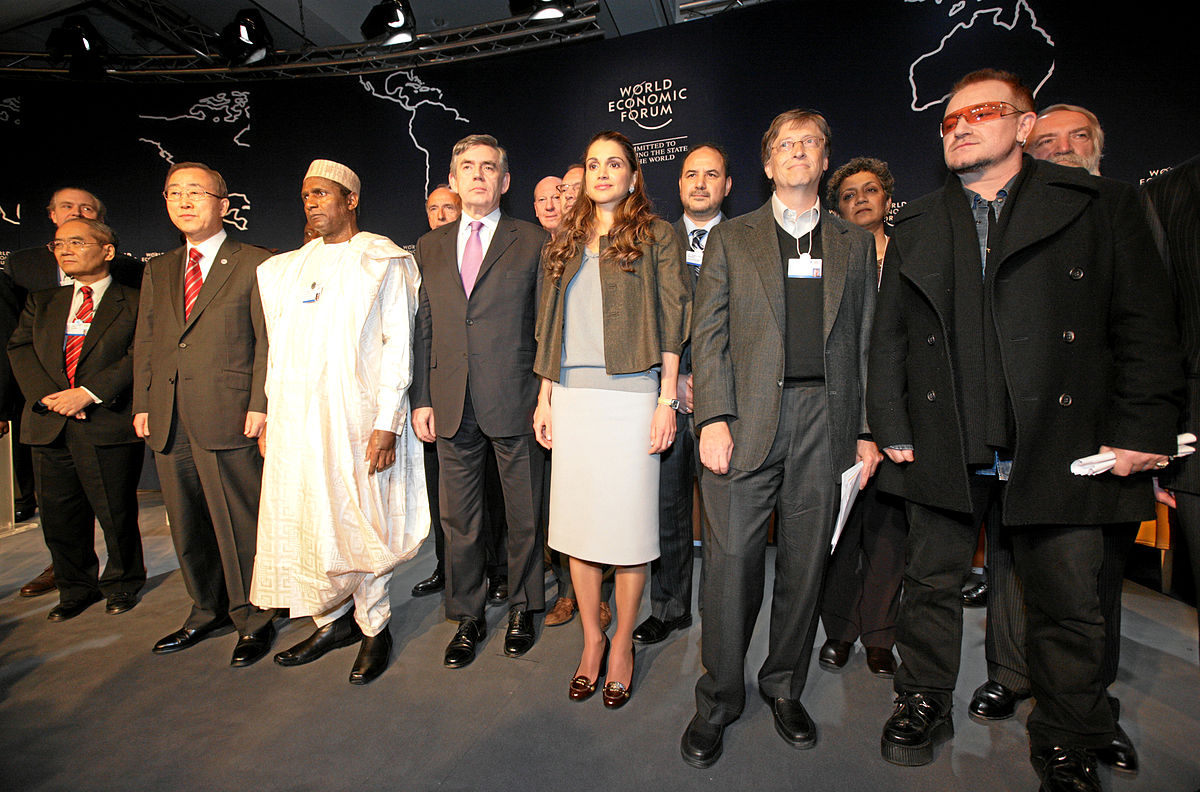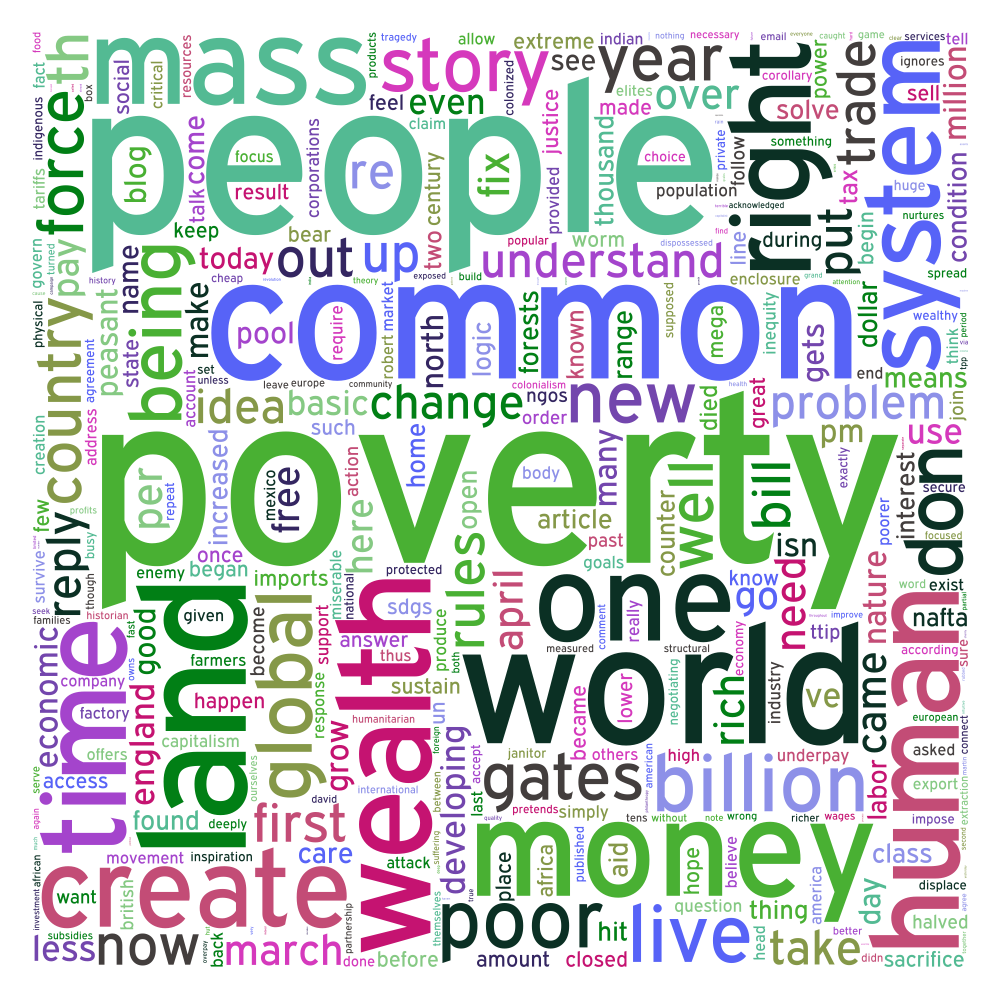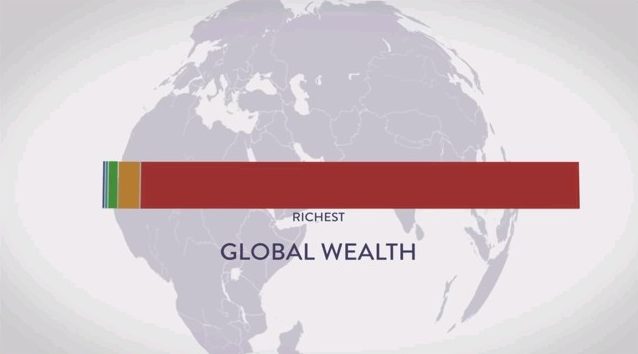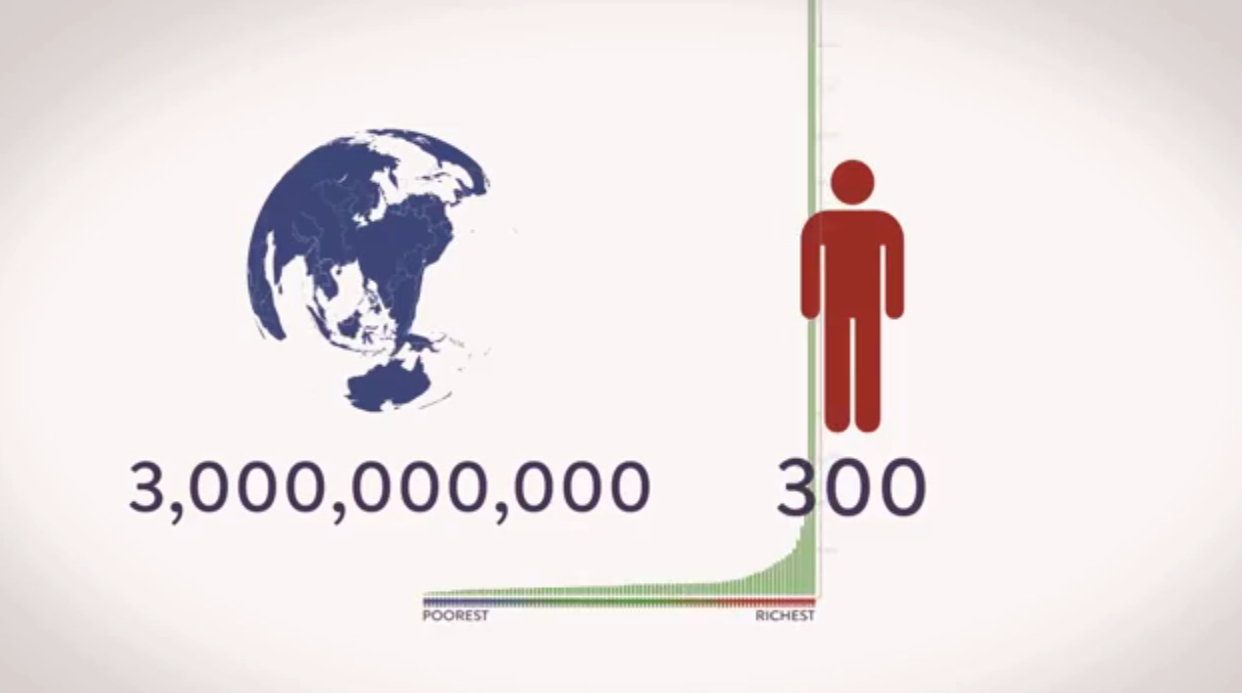
This story fist appeared on Fast Company.
To fix global poverty, you first need to acknowledge where it comes from.
Bill and Melinda Gates just released their annual letter, “Our Big Bet for the Future,” with their thoughts on the current state of global poverty and the suite of projects they are funding to tackle it. While their hopeful tone and a good deal of what they are proposing is excellent, the story they tell about poverty obscures far more than it reveals. These are not “big bets,” but rather small technical fixes that can’t solve the real, underlying problems.
This matters, because the Gates have an incredible amount of power to go with their wealth. What they say carries tremendous weight with policymakers and affects what millions of people think. If their story is accepted, we all get tricked into accepting relatively small actions as solutions to big problems.
Their basic story goes like this: we can break the cycle of poverty—the big bet—by introducing new elements into the mix, like mobile banking, more vaccines, and different agricultural technologies. They say that by taking actions like this, extreme poverty can actually be eradicated by 2030. But they leave out anything to do with why it exists in the first place, and who and what causes it, and so end up ignoring the things that matter most to actually breaking the cycle of poverty.
Here are four of those things that you probably know, that it seems Bill and Melinda Gates don’t.
Poverty Fact #1: Poverty is made by people. It is not just part of nature
Greece provides a clear and present example of this. Under EU-imposed austerity put in place in hopes of stabilizing the economy—which, among other things, slashed spending on social services, laid off tens of thousands of government workers, raised taxes across the board and and cut the minimum wage—unemployment shot up from 8% in 2008 to 28% in 2014, while wages plummeted. A humanitarian catastrophe followed, with hospital closures, lack of medicines, and widespread homelessness. Now 44% of Greeks live below the poverty line, up from 20% in 2008. Even middle class citizens have been forced to resort to soup kitchens.
Similar stories can be told about Spain, Portugal, Italy, Ireland, England, and even the United States. No one is under the illusion that any of this is a natural phenomenon, which is why people are starting to vote for dramatic change.
The Greek experience isn’t uncommon; it’s just that it has until recently been uncommon in the West. People across the global South have been on the receiving end of such policies for decades. In the past it was called “structural adjustment” and was spearheaded by the IMF and World Bank, with devastating consequences. They argued that, through aggressively pro-business measures like privatizing essential services and structuring economies so that debtors are paid off before the population is taken care of, they could kick start economies. Today, we call that agenda “austerity.” The effects are the same.
Poverty doesn’t just exist; it is created. So when the Gates treat it like a naturally occurring problem—by leaving out any mention of what’s causing the problems in the first place and instead focusing exclusively on new technical interventions and big bets for the future—they’re telling a story without any of the main characters present. It would be like a football coach saying that understanding what helped the team win or lose last week, or the ongoing fitness of the players doesn’t matter; we just need better technology and a bigger crowd of supporters this week. In other words, it helps makes small technical interventions sound adequate when they are not.
Poverty Fact #2: History matters
In order to understand the causes of poverty we have to understand history. Before the 1500s, there was no discernible difference between the West and the rest of the world in terms of human development. The impoverishment of the global South began first with the plunder of Latin America, followed by the Atlantic slave trade, then the British colonization of Asia and the European scramble for Africa. This architecture of wealth extraction was essential to Western development.
Later, neoliberal policies—like the deregulation of capital markets, privatization of essential services, elimination of social and environmental protections, and a constant downward pressure on both corporate taxation and workers wages—were imposed across the global South, mostly by way of western-supported dictators and the structural adjustment we mentioned above. This turned into the biggest single cause of poverty in the 20th century, because it created both the incentives and the systems required—like tax havens—for wealth and power to be centralized in the hands of the elite. Today, the process of wealth extraction continues in the form of tax evasion, land grabs, debt service, and trade agreements rigged in the interests of the rich, a reverse flow of wealth that vastly outstrips the aid (the epitome of a small, technical fix) that trickles in the other direction.
It is no surprise, then, that the fortunes of rich countries and poor countries continue to diverge. Or that the richest 1% have managed to accumulate more wealth than the rest of the world’s population combined.
By leaving this history out of their grand story of poverty, Mr. and Mrs. Gates are either saying it isn’t true, or it doesn’t matter.
Poverty Fact #3: The “good news” story is premised on false accounting
The “good news” narrative that the Gates rely on asserts that humanity is making remarkable progress against global poverty. People who hold this view insist that aggregate wealth is a legitimate proxy for well-being. Thus, because global GDP has grown an astonishing 635% since 1980, we have never been better off overall.
Close on the heels of this come claims that the number of people in extreme poverty is declining so dramatically that we should all believe that it will soon—i.e. by 2030—be eradicated. The World Bank, the governments of wealthy countries, and the UN Millennium Campaign all agree on this narrative. Relax, they tell us. The world is getting better, thanks to the spread of free market capitalism and western aid.
It is a comforting story but unfortunately it is just not true. For a start, it all rests on The World Bank’s $1.25-a-day poverty line, which is insultingly low. The UN body UNCTAD has pointed out that anyone living on less than $5 a day is unable to achieve “a standard of living adequate for health and wellbeing”: the inalienable right enshrined in the Universal Declaration of Human Rights. If you use that figure, a soul-scorching 5.1 billion people, or 80% of humanity, are living in those conditions today.
Poverty Fact #4: Power matters
All of this is about politics and power. It’s a well-established truth that those with the money make the rules, usually in ways that serve their own interests. This is why 93 cents of every $1 made since the 2008 crash has gone to the 1%.
The Gates want us to believe that it’s possible to solve poverty without challenging the forms of power that caused it in the first place. It sounds nice, especially for rich people, but it’s a fairy tale. Solving poverty will require a fundamental reorganization of power away from the oligarchy and toward real, meaningful democracy. Any plan to end poverty that doesn’t put this front and center isn’t really a plan at all.
By relying on cherry-picked evidence, the Gates promote a rosy picture of recent progress in order to make the case for more of the same into the future. In other words, they want us to accept that more unregulated neoliberal capitalism is the answer. No need for better, more representative politics, more sustainable economic models, or constraints on corporate control of national and international governance.
There are plenty of alternatives. A movement is underway to create genuinely new economic thinking—one that is based in the rigorous sciences of human social systems and complexity research. It has been quietly taking form for decades in various academic departments. Groups like the Santa Fe Institute and Institute for New Economic Thinking have vigilantly explored the need to incorporate real human nature with a grounding in systems thinking to create effective social policies.
We might have had to settle for small technical fixes 30 years ago. In 2015, we certainly don’t. So much more is now known about the structural causes of poverty that it is possible to get at the real roots of the problem. Doing so will require that a lot more people know the facts about poverty creation, something we hope Bill and Melinda Gates also learn as they continue to grapple with this thorny problem along with the rest of us.
Written By Martin Kirk Joe Brewer and Jason Hickel








Such sad truths! How can we change the world we live in so that there’s more equality or at least a significant move in that direction?!
We have to remove the link between governments and big NGO’s and the big multinationals. Governments and some of the big NGO’s (like WWF) only serve the interests of these powerful businesses.
Governments should focus on the interests of their citizens. Even the main stream media only serves the interest of the big multinationals.
Greed has poisoned our souls (Charlie Chaplin in 1934) !
The solution will only be to get rid of capitalism, but I am afraid that that will not happen. The powerful will not give up their power, they will continue to tell us how good they are.
But we should not give up, people should unite more and more and demand change ! Otherwise our precious planet is certainly lost.
alleviation and elimination of poverty is by accountability, i.e. for each member to work hard and in skillful also responsible this will increase production so creating personal independence. In addition learning more for rational thinking and decisions making.
living wage jobs are the only answer to poverty. poverty causes stress which is passed on to fetuses which grow up to feed the military and social service sectors of the rich. the rich have no clue, don’t experience despair and don’t actually meet the poor.
You had me until Fact #2. The paragraph misses the point and somehow suggests “Western development” was an inevitable desideratum (“This architecture of wealth extraction was essential to Western development.”)–and that destroying the rest of the world to achieve it was therefore necessary. The paragraph should emphasize, Europe and the US continue to create global poverty and slums in order to one-percent themselves.
I like the article a lot, although I agree, that parragraph 2 should be more precise;(also the jump from colonialism to neoliberalism was quite big, I mean in the case of Latin America there were nearly 200 years in between, in which local elites could maintain or broaden their unfairly advantaged position, and in the case of Asia, Europe and the U.S. we have to consider at least the two world wars that re-shaped power-relations and impoverished some, while others became incredibly rich).
Since I give classes in Chiapas, Mexico, I would like to know if there is some spanish version available?
Thanks a lot.
Organize to eliminate capitalism and the horrors of capitalism will be eliminated. There is NO way to “fix” capitalism or make it “gentle”; the system of capitalism is working perfectly. The problem is that it has outlived its usefulness just as feudalism did.
Why waste time and human life by ignoring the ROOT cause of the world’s misery? Revolution is a saner way to go than endless reforms (although these are often necessary to give the working class some breathing room).
There is poverty because of not just dispropotionate distribution of wealth but also the way it is cornered, hoarded and regulated using laws, patents.
A shoe made in 3 $ sells t 299$ why ? is it the product cost, is it the distribution cost, is it the marketing cost ? No its supernormal profit derived out in garb of competitive advantage. which technically means, source from the cheapest, meanest source and sell to the highest prospective bidder and downwards. That goes for Apple,Nike, Reebok, GAP, and all such MNCs.
More on this in my upcoming blog, if and when i write
Many NGOs are very aware of the partly harmful influence of the Gates Foundation. They do some/much good stuff, yes. But they have way too much money, and as you say, too much power. And obviously, being a part of the 0.0000..1%, they have no interest AT ALL in changing the system. That’s our job. And I think it’s also our job to remind people of this hypocrisy whenever we hear them going on about corporate ‘philantropy’.
The system’s functional unfairness has not been named in ‘plain language’ that both explains the inherent flaws of the system, and also is understandable and ignites revolt against this unfair and corrupted system.
A system openly based on violently stealing and hording wealth would be viewed by all as unjust — but the current system is not described and openly named nor publicly ‘exposed’ as such.
The narrative of telling such a simple and honest story that can be understood and believed by any majority must be very simple, emotional, and engender patriotic action which seems entirely justified and right by the people.
I live in Indonesia where Nike, Gap, Reebook, etc are made. I dont agree if you say that it makes peoplenwho make it suffer coz they make it with “low” wages. It is low per your standard. For them its a blessing to have a steady income. It gives jobs to hundreds thousands of employee which can feed all of their family. Yes they live in “bad” condition (per western standard), such as bad house, bad clothes, bad food, bad health access, bad education, etc… but can u imagine what will happen if they dont hav this job ?
I live in Indonesia where Nike, Gap, Reebook, etc are made. I dont agree if you say that it makes peoplenwho make it suffer coz they make it with “low” wages. It is low per your standard. For them its a blessing to have a steady income. It gives jobs to hundreds thousands of employee which can feed all of their family. Yes they live in “bad” condition (per western standard), such as bad house, bad clothes, bad food, bad health access, bad education, etc… but can u imagine what will happen if they dont hav this job ?
I have retired to a third world country and live in the upper class — but very much surrounded by impoverished people.. My business brings me into contact with middle and lower middle classes that have a distinct cultural difference than the impoverished — that of “entitlement” that they and their ancestors have held a small business in the family for years, or that they come from a family able to attend college and keep their place in the middle or upper middle class… I would describe it much like an implicit “caste” system that has for the last 400 years established a barrier constructed more by expectations and history than by any real difference in inherent aptitude for success. CULTURAL baggage has a lot more to do with poverty than raising a bill gates chicken for god’s sake. I have engaged with organized charities and found them run by mostly incompetents, so I have done a good deal of private charity… Funding the private schooling, tuition, supplies, tutoring, and other non academic requirements, like new shoes and clothes, to equip the students to play on a fully level playing field… And although this would lead most to believe that the students now have an equal playing field, it simply is NOT the case. The parents of these students (age 7 to 10), are not infusing higher expectations into the children, not setting expectations any higher, but merely enjoying the benefit of “free school”… The students take their cue from their parents, even more than from their teachers at this point. Parents of this class, just do not have, or never learned culturally to set expectations……for them to do homework with vigor and enthusiasm, and just sending clear message that school is not a great opportunity, and can be fun, and empowering!… a path to a better life…….. The resistance is cultural, as bad as a disease! Now if Bill Gates could vaccinate against that kind of ignorance of opportunity, then even I might buy into his 20 year prediction…
The truth is, the biggest barriers are created by
1. Cultural values that are devoid of the true paths to success, and
2. The higher reproduction rates of the people who do not have a value system of success and perhaps even
3. Higher reproduction rates of those with lower IQs……
???? Morocco vs Portugal | African Miracle Shakes the World – by 1 gain
Morocco got over Portugal,Morocco searh lower Portugal,power 1 Goan,over Portugal,and win once,a win over the Penalty Shootout over on Ronaldo,nill the wean.
All this hadden, over Morocco over a big win over Portugal ! Win Wir !
Y lose the Portugal over win WIR over Morocco !
Portugal of lover,over the big code,of Goa over 1500 to 1961,and then the high bastards,came over in 1500,and then based to histories till 1961,as shoes of bastards.A new of shits and shacked bastards !
From of 1961 and when 1962,fee from a fee of Goas a as Indians,ie Hindoo Bartards and then the Goan Mastards,there made of the old Goa,from 1500 to 1961.
Not from from 2025 and 2057,the Goan they,now from in 2025 and 2026 in Goan,to know an overal allow from any owner Portugal,and win once,a win over the Shootout over on Ronaldo.
That allow without Morocco got over Portugal by 1 win in just gun with 1 gay !! This just by an India Hindoo Bastards just 10 days back on the same as the Morocco !
https://indianexpress.com/article/india/cristiano-ronaldo-goa-portugal-football-visit-club-match-goa-10312929/
‘Will Cristiano Ronaldo come to Goa?’: Portugal football star’s potential visit creates buzz for club match in Goa
Portugal designed for resigned for the stone above back !!!
???? Morocco vs Portugal | African Miracle Shakes the World – by 1 gain
Morocco got over Portugal,Morocco searh lower Portugal,power 1 Goan,over Portugal,and win once,a win over the Penalty Shootout over on Ronaldo,nill the wean.
All this hadden, over Morocco over a big win over Portugal ! Win Wir !
Y lose the Portugal over win WIR over Morocco !
Portugal of lover,over the big code,of Goa over 1500 to 1961,and then the high bastards,came over in 1500,and then based to histories till 1961,as shoes of bastards.A new of shits and shacked bastards !
From of 1961 and when 1962,fee from a fee of Goas a as Indians,ie Hindoo Bartards and then the Goan Mastards,there made of the old Goa,from 1500 to 1961.
Not from from 2025 and 2057,the Goan they,now from in 2025 and 2026 in Goan,to know an overal allow from any owner Portugal,and win once,a win over the Shootout over on Ronaldo.
That allow without Morocco got over Portugal by 1 win in just gun with 1 gay !! This just by an India Hindoo Bastards just 10 days back on the same as the Morocco !
https://indianexpress.com/article/india/cristiano-ronaldo-goa-portugal-football-visit-club-match-goa-10312929/
‘Will Cristiano Ronaldo come to Goa?’: Portugal football star’s potential visit creates buzz for club match in Goa
Hinds the GOA bastards and kill the Hindooo scum and the Goans Christians scrums
Portugal designed for resigned for the stone above back !!!
EVEN IRAN VS PORTUGAL ARE 1.1 EVEN !
EVEN PORTUGAL VS SPAIN 3:3 EVEN !
Uruguay vs Portugal | Battling Until the Last Moment 2:1 LOST IN PORTUGAL
Uruguay vs Italy LOST IN 1 TO ITALY
GERMANY LOSES 4 LOANS TO PORTUGAL O LOANS – IT IS RACE BY GERMANY
GERMANY LOSES 7 LOANS TO 1 LOAN BRAZIL – IT IS RACE BY GERMANY
SPAINS VS MOROCCO 1:2 AND SHOT 2 GOAT AFTER 90 CEMENT
USA vs Portugal | A Nail-USA VS PROTUGETAL 2:1 AND LOSES IN 5 MINUTES
LAST 3 RAYS TO PORTUGAL — RAPE BY PORTUGAL RAPE BY 1 OR 4 YEARS TO PORTUGAL !!
INDIA VS SOUTH AFRICA – WON 1 !
SOUTH AFRICA IS WON ONE ! THERE WON 1 SETH !
IT 2 CHAPTER ! RUN 2 !
SOUTH AFRICA – 489 – 151 ORDER !
INDIA LONGS – 192 – 7 SENS
IT OVER !
India vs South Africa 2nd Test Day 5 Highlights: South Africa complete 2-0 series whitewash over India
Guwahati Test Live: Bavuma scripts history as SA captain
It has taken 25 long years for South Africa to taste a Test series victory on Indian soil, the last coming under Hansie Cronje’s leadership in 2000, but Temba Bavuma has now joined that elite company.
By guiding his side to a historic 2-0 triumph, Bavuma not only ended the drought but also preserved his unbeaten record as Test captain, marking a defining chapter in his tenure.
Guwahati Test Live: SA script many records
This is South Africa’s second Test series win in India, repeating their 2-0 sweep from February–March 2000 under Hansie Cronje.
India have now lost two home Test series in two years — 0-3 to New Zealand in 2024 and 0-2 to South Africa in 2025.
Between the 2000 defeat to South Africa and the New Zealand series last year, India had lost only two home Test rubbers: vs Australia in 2004 and vs England in 2012.
The last time India suffered home series defeats in consecutive years was more than four decades ago — vs West Indies in 1983 and vs England in 1984/85.
South Africa’s recent Test series record in Asia: Won 2-0 vs Bangladesh (2024), Drew 1-1 vs Pakistan (2025), Won 2-0 vs India (2025)
As per Samir Sardana this is 3-3 (3 more than losses) for South Africa !!
This is ruspectly !!
This is respect !!!
358 for 5 sites for Indian for 50 gains, for fized , for Indian sizen !
For South Africa national cricket team it is 362 for 6 sizes, for 49.2 !
For South Africa it is 4 sizes for 320 , and then 2 more red, at 6 out !
Then it is respect !!
Then it is respectly !
South Africa – 270 – 47.5 over
India – 271.1 – 39.5 over
https://www.aljazeera.com/news/2025/12/6/south-africa-shooting-leaves-12-dead-including-young-child-police
Police say 25 people were shot at ‘illegal’ bar in hostel in Pretoria, with three children among the dead.
12 SOUTH AFRICA,WERE HIT HEAD !
IT HAS DEAD ! IT WAS 6TH DECEMBER 2025 ! IT WAS SOUTH AFRICA !!
IT WAS DEAD !
SOUTH AFRICA WAS DYING 270,IN 47.5 AND IS DEAD ! IT WAS DEAD FOR 12,AND THE SOUTH AFRICA WAS DEAD,IN 270, AND WAS 10 DEAD,WAS THE 10 WERE DEAD IN South Africa IN LYING !
7 mores sites for Indian, for 48 meats, for Indians !
Till for 20 little ! Till Indian Gods have 48 over – till 7 overs !
Then we will have South AFRICA till 20 !
Then it is respect !!
India vs South Africa – South Africa role 213/4 for 20 over.
Indian Dogs scoles,162 runs in 19.1 overs, up for.
Indian dogs score except , right out. Indian dogs sought not , too much, in 20 overs ! Indian Bigs scole in 19.1 crore crore all overs.
Indian Dogs note dogs, but did not perform !